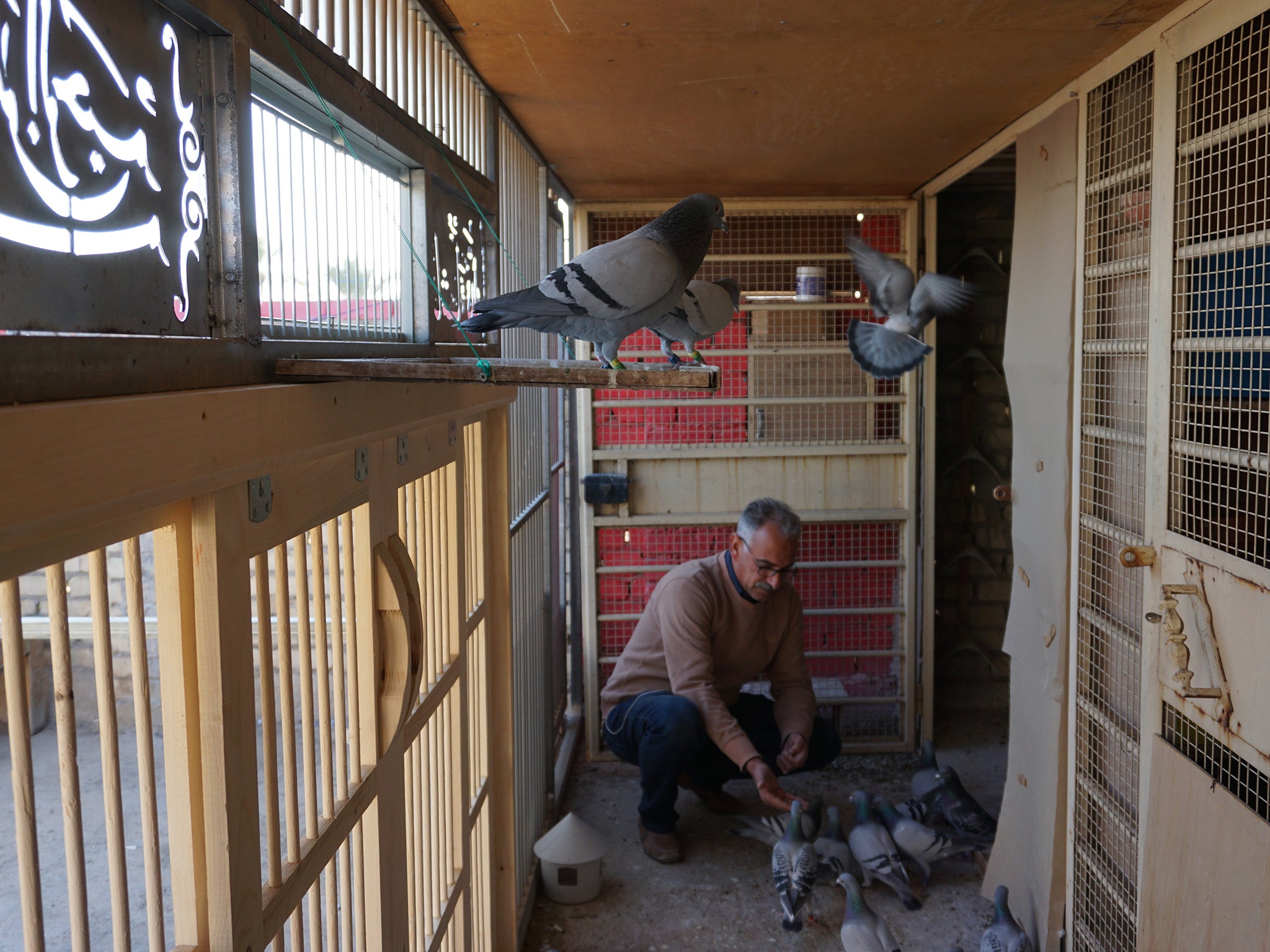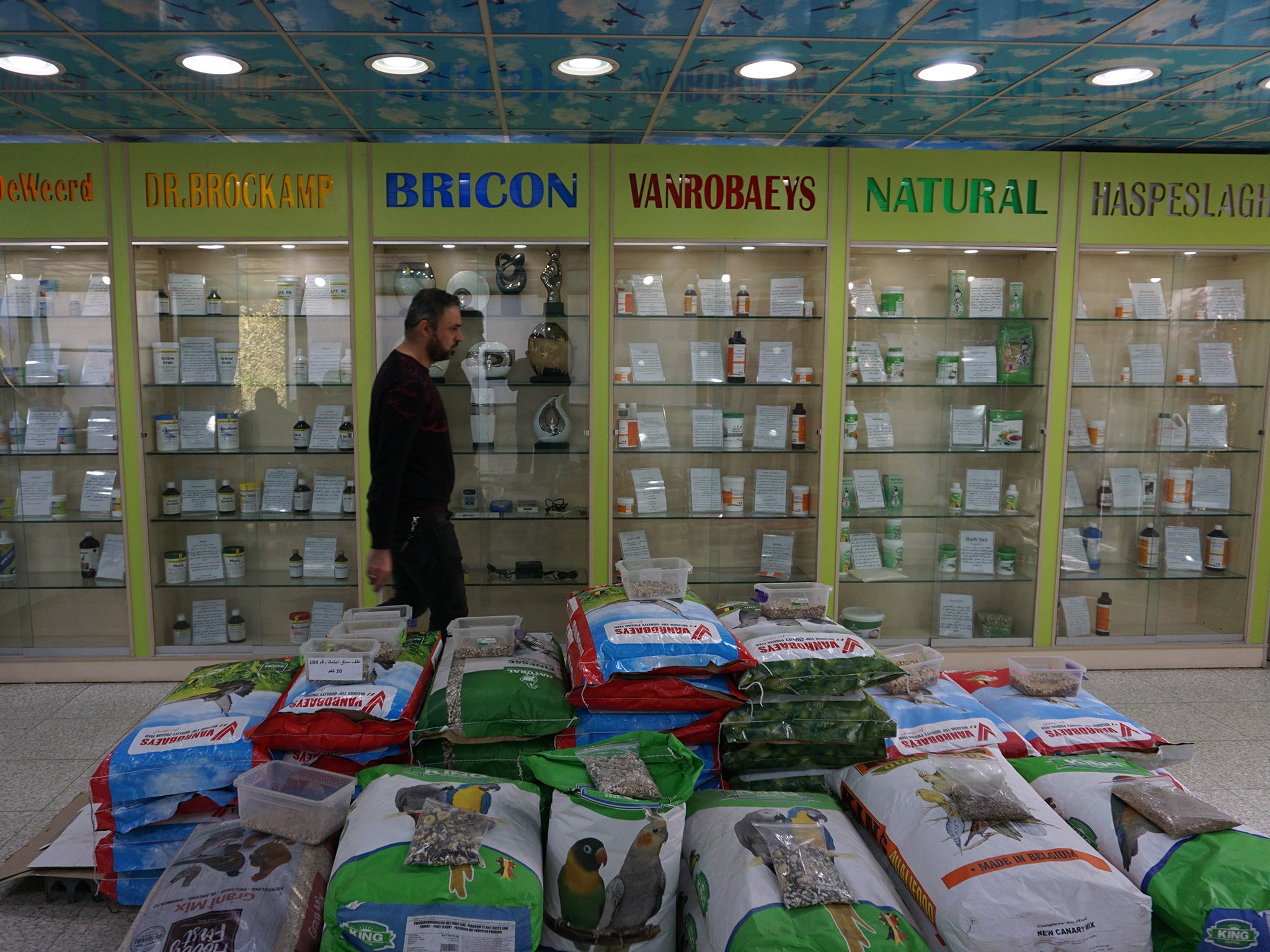How Iraqis are finding peace by reviving the sport of... pigeon racing
Spending thousands on prize birds and all the kit to keep them healthy, well-to-do professionals are searching for calm high above the militarised streets of Baghdad, write Mustafa Salim and Tamer El-Ghobashy

Your support helps us to tell the story
From reproductive rights to climate change to Big Tech, The Independent is on the ground when the story is developing. Whether it's investigating the financials of Elon Musk's pro-Trump PAC or producing our latest documentary, 'The A Word', which shines a light on the American women fighting for reproductive rights, we know how important it is to parse out the facts from the messaging.
At such a critical moment in US history, we need reporters on the ground. Your donation allows us to keep sending journalists to speak to both sides of the story.
The Independent is trusted by Americans across the entire political spectrum. And unlike many other quality news outlets, we choose not to lock Americans out of our reporting and analysis with paywalls. We believe quality journalism should be available to everyone, paid for by those who can afford it.
Your support makes all the difference.On a muddy berm on the edge of a wheat farm about 100 miles south of Baghdad, a dozen flatbed trucks carrying £11m in precious cargo slowly line up before dawn.
At first light, men with sticks and hammers begin banging on the cages stacked on the back of the trucks – rousing 14,000 pigeons into a frenetic and unruly chorus of deep coos and grunts. Moments later, at the blast of an air horn, the cages are opened in unison and the birds take flight, the force of 28,000 wings generating gusts of wind as the pigeons hurtle in a single direction: to Baghdad.
Six months of practice runs and strict conditioning culminate in a launch that lasts less than a minute. But the birds carry with them the hopes of men who have spent thousands of dollars and hundreds of hours training them.
These are the highflying pigeon races of Iraq.
From October to March, when Iraq’s winter temperatures climb down from summer summits, thousands of Iraqis race their pigeons in contests that can stretch as far as 600 miles, from Mosul in the north to Basra in the south, competing for bragging rights, modest purses and the satisfaction of knowing they raised a champion.
Elite birds, which can fly up to 90 mph, are much sought after, with racing pigeons from a coveted European lineage costing £3,000. One such bird sold at auction for £70,000 in Basra.
A stable of pigeons usually numbers between 50 and 100, with each prize bird requiring about £75 worth of feed, vitamins, herbal teas and omega-3 supplements per racing season to maintain peak fitness.
Pigeon racing, a sport on the decline in the United States and Europe, where it was developed, is taking off in Iraq. After nearly 20 years of conflict in the country, the rising popularity of pigeon racing is a signal that “our people want to practice peace”, says Kamil Khinyab, the 52-year-old undisputed godfather of pigeon racing in Iraq.
It is a peace that comes high above the perpetual gridlock, heavily armed soldiers and chaos of Baghdad’s streets. In their rooftop pigeon lofts, the hobbyists are in total control.
“If your pigeon wins, it’s only because of your efforts... if it loses, it’s because you need to do better raising it,” Khinyab says with a smirk.
The ranks of the pigeon fanciers include medical doctors, academics, high-level military, police, and intelligence service officers and engineers. These are prestige professions, and judging from the investment required, this is not a sport for the riffraff.
But the racers have long been stigmatised as scoundrels.
They are known locally as “matyarchi”. At best, they’re regarded as loners who waste their life doting on a bird that lacks any prestige. At worst, they’re suspected of being perverts who use their high-perched pigeon lofts to spy on neighbours or sneak a peek at the woman next door hanging laundry.
One saying in Iraq goes, “Never trust the testimony of a matyarchi.” When someone looks to the sky furtively, others often inquire: “What’s wrong with you? You have the eyes of a matyarchi.”
The term itself drips with contempt. The Arabic suffix “chi” is generally reserved for bad habits and jobs of low social status. In Iraq, an excessive drinker is an “arakchi”. A gambler is known as a “qamarchi”, and the person who fixes flat tires is “bancharchi”.
But Khinyab and his community of pigeon fanciers say they’re engaging in a cerebral and competitive gentleman’s sport. “What makes someone successful at this hobby is intelligence above all – then care and mercy for the birds, which Iraqis have in abundance,” he said.

Khinyab knows what he’s talking about. He revolutionized the sport in Iraq.
An engineer by training, he came to racing in 1999 when a friend showed him how a pigeon, just three months old, could find its way home from 140 miles away.
“I was fascinated with how intelligent they were, and I fell in love,” he said.
He asked his friend and a cousin who also raised pigeons to give him a few birds to train, and he set up a rooftop coop, building high walls around it to protect his reputation. Khinyab collected 23 birds, paying 210,000 dinars for one he was sure would be a perennial winner. Back then, that sum could furnish an entire house or buy a reliable car.
“I faced a lot of criticism from my family, but I’d show them [European] magazines where they listed pigeons worth $5,000 and $10,000.”
His early results didn’t help his cause. During training sessions, all 23 of his pigeons flew away and never returned.
Despite the costly blunder, Khinyab rebuilt his stable. He learned the key was to launch the pigeons close to their loft at first, until they reliably returned home, and then gradually increase the distance over time.
What started as an obsession has now turned into a career. He runs Baghdad’s best-known pigeon club – a place that sells antifungal and anti-worm solutions, vitamins and other imported products needed to raise the fastest, strongest and smartest pigeons. It is also a gathering place for pigeon fanciers, a must stop for visitors from other provinces keen on learning the craft.
On a recent evening, Khinyab presided over a boisterous gathering of competitors who had come to register their pigeons for a race the next day. As male and female birds were separated to prevent unwanted breeding, the owners exchanged warm greetings with hugs and kisses, referring to one another with the honorific “Champion”.
“It’s competitive,” Khinyab says. “But there’s also a deep brotherhood among the participants.”

In pigeon racing, the birds are launched together, and then each bird flies to its home.
Back in the day, owners would track their pigeons by tearing a dinar note in half, so that each half showed the same serial number, and then affixing one half to a pigeon’s leg and giving the other to a judge. The owners would wait at home for their birds to arrive, then grab the pigeon’s half of the dinar note and furiously drive to a club and check in with the judges.
It was woefully imprecise. Racers whose lofts were closest to the club were almost always declared the winner.
Khinyab devised a better system. He divided a map of Baghdad into districts, and judges were assigned to locations within a mile of all the lofts in their district. The new system was quickly embraced by fellow racers.
But it took the US invasion of Iraq and the toppling of Saddam Hussein to bring the races into the modern era. The country, which had been cut off by sanctions and government corruption, was flooded with imports of all types. Amid the new marvel of cellphones and the myriad brands of blue jeans, there was now a possibility to import computer devices known as Bricon machines, invented in Belgium for the sole purpose of pigeon racing. Pigeons could be outfitted with a leg ring containing their registration number, and it would be digitally recorded when they reached their loft.
Khinyab brought thousands of the devices to Iraq, and interest in the sport soared.
Just as pigeon racing has exploded in popularity, so too has the practice of kidnapping prize birds for ransom. One village, located along the Baghdad-to-Basra Grand Prix route, has become infamous.
Young men and boys wait on the edges of the village, Talihah, until they spot flocks of birds flying towards their destination. Using sticks, stones and pieces of barbed wire, the would-be kidnappers try to bring down the birds without killing them.
Most owners attach their phone number to their birds’ legs. The pirates call and demand a sum of about £20 or mobile phone credits.
Along Talihah’s muddy, unpaved roads, the bandits are unapologetic. Asked whether the village is indeed known for pigeon piracy, Hussein, a 32-year-old shopkeeper, proudly responds, “It’s true!”
Wissam, 19, adds: “If they manage to cross our village safely, they’re in the clear. This is the most dangerous place for them.”
Sattar Dayekh, a 40-year-old pigeon breeder who lives in the village, doesn’t condone the banditry, but he says he understands why his neighbours do it.
“These are poor kids looking to make some money,” he says. “If the racers don’t pay them, they’d stop hunting them. Besides, they can afford it.”
A few days after the Zubaydiya race, Khadim Hamid, a 49-year-old who owns a welding shop, was taking stock of his racing pigeons. All 50 made it home, but none had broken into the top 10 – the benchmark for a good run. Though his home is stacked with trophies, the latest result bothered him.
“To be a winner, you should know what your bird needs only by looking at it – and [then] provide it for it,” he grumbles.
Race purses are never more than £150 for a first-place finish. The real money comes in raising champions and selling them to other racers for breeding.
And then there’s the sheer satisfaction of bragging rights. Pigeon owners spend the six months ahead of the racing season chirping about how they are the best.
“When the season comes, there’s no bigger pleasure than shutting them up,” Hamid says.
So he says he is contemplating spending a little more money to renovate his loft, which sits atop his two-story house in a leafy neighbourhood of Baghdad. It would cost him about £3,000.
© Washington Post
Join our commenting forum
Join thought-provoking conversations, follow other Independent readers and see their replies
Comments